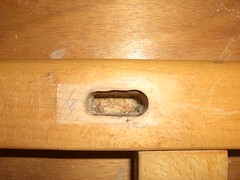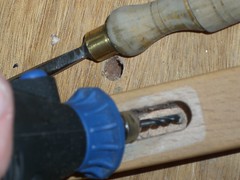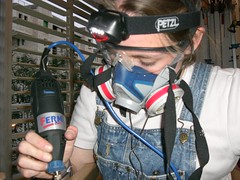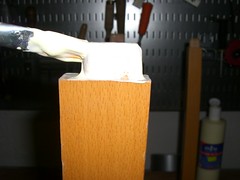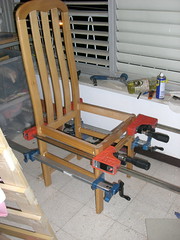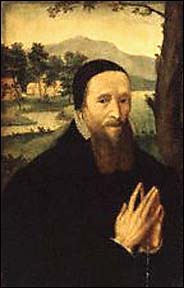
Owen, Nicholas [St Nicholas Owen, called Little John, Little Michael] (d. 1606), carpenter and Jesuit lay brother, was born in Oxford, probably in St Peter le Bailey. On 2 February he was apprenticed for eight years to William Conway, an Oxford joiner. He sometimes used the aliases Draper and Andrews. He had three brothers: John (b. 1560), a seminary priest; Walter (1568–1591), who died as a deacon at the English College in Valladolid; and Henry, who was apprenticed to the university printer Joseph Barnes and later ran secret presses in the Clink prison in London and in Northamptonshire. All four may have been sons by a previous marriage of Walter Owen (d. 1607), a carpenter who leased 3 Castle Street from Magdalen College from 1566 onwards and whose wife Agnes (d. 1609) was a recusant in 1603–4.
In 1588 Nicholas Owen became servant to the Jesuit superior Henry Garnet. From then on
his chief employment was in making of secret places to hide priests and church stuff … in all shires and in the chiefest Catholic houses of England … of several fashions in several places, that one being taken might give no light to the discovery of another. (Catholics under James I, 182–4)From documentary and architectural evidence it is possible to identify the characteristics of his work: a liking for sites away from outside walls; an ability to think in three dimensions and in curves; and the inventiveness noted by John Gerard and not shown by some other builders. Surviving examples include those at Oxburgh, Norfolk (1589?); Baddesley Clinton, Warwickshire (1588–91); Braddocks, Essex, and Sawston, Cambridgeshire (both 1592–3); Scotney Old Castle, Kent (by 1598); and Harvington, Worcestershire (about 1602).
On 23 April 1594 Owen was arrested with John Gerard at a house in London. He was tortured, but gave nothing away and was released for ‘a good round sum of money’ (Catholics under James I, 183). In October 1597 he helped Gerard to escape from the Tower of London. About 1600 he became a Jesuit lay brother and an accident with a restive horse left him with a slight limp. Both he and Henry Garnet were finally taken at Hindlip, Worcestershire, during a twelve-day search in January 1606 when ‘eleven secret corners and conveyances were found in the said house’ (BL, Harleian MS 360, fol. 101r). Owen and a companion, Ralph Ashley alias Chambers, were starved out of a hide in the long gallery on Thursday, 23 January, after four days with one apple to eat between them. Owen was imprisoned first in the Marshalsea and then in the Tower, where he was ruthlessly tortured despite suffering from a rupture. He died of the torture on the night of 1–2 March; according to Gerard, ‘his bowels gushed out together with his life’, and the official version was that he had ‘ripped up his own belly with a knife without a point’ (BL, Stowe MS 168, fol. 364r). According to Henry More he was buried within the Tower, in ipsa arce (Historia provinciae Anglicanae, 1660, 322). He was beatified by Pope Pius XI on 15 December 1929 and canonized by Paul VI on 25 October 1970.
Michael Hodgetts
Sources
The condition of Catholics under James I: Father Gerard's narrative of the Gunpowder Plot, ed. J. Morris, 2nd edn (1872) · John Gerard: the autobiography of an Elizabethan, trans. P. Caraman, 2nd edn (1956) · J. Morris, Life of Fr John Gerard (1881) · M. Hodgetts, Secret hiding-places (1989) · M. Hodgetts, ‘The Owens of Oxford’, Recusant History, 24 (1998–9), 415–30 · A. Hogge, ‘Closing the circle: Nicholas Owen and Walter Owen of Oxford’, Recusant History, 26 (2002–3), 291–300
Archives
TNA: PRO, two brief confessions of 26 Feb and 1 March 1606, SP 14/216/ii/192, 194
Likenesses
engraving, repro. in M. Tanner, Societas Jesu usque ad sanguinis et vitae profusionem militans (Prague, 1675), 74
| © Oxford University Press 2004–9 All rights reserved: see legal notice | |
| Michael Hodgetts, ‘Owen, Nicholas (d. 1606)’, Oxford Dictionary of National Biography, Oxford University Press, Sept 2004; online edn, Jan 2008 [http://www.oxforddnb.com/view/article/21023, accessed ] Nicholas Owen (d. 1606): doi:10.1093/ref:odnb/21023 [Previous version of this biography available here: September 2004] | Site credits |

